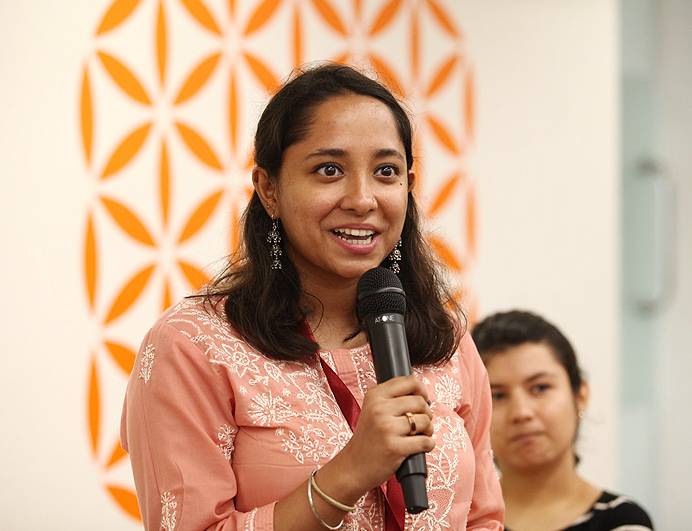Vedica through the eyes of Aditi, Class of 2020.
Even though a first promotion delights most young professionals, sociology graduate Aditi Prabhu, who began as an analyst with an international giant like Accenture, wasn’t thrilled when she was promoted to a Quality Auditor. She felt lateral growth had led to stagnation while Aditi still aspired for more. That’s when she quit her comfortable job and enrolled for management education at Vedica. An observable trend amongst the young, Aditi expected and wanted more from her education than other traditional MBA programmes, and feels her choice to study at Vedica has been ideal.
The Aurangabad girl had made her transition to the North at an early age. Not unfamiliar to an all-girls learning environment, she finished school in an all-girls convent, after which she majored in humanities at Kamala Nehru College. “Sociology teaches you way beyond academia. You become more self-aware of things happening around you,” she says. Self-aware and determined to achieve her dreams, we sat down with Aditi to try and trace her steps.
What about an all-girls environment appeals to you?
I think there is a sense of belonging, a kind of sisterhood that becomes your comfort space. You meet others who are going through the same experiences and facing similar problems which develops a comfort level amongst women and a camaraderie that strengthens each other.
Did you always want to come back to academia after your graduation?
I come from a family of educationists who wanted me to get back to studies. But I had decided to do things my way and pursue my academic and professional interests. After coming across a job offer at Accenture, working with a project for Google, I suddenly found myself in the corporate sector.
Did it take time to settle into that space?
It was interesting because I had a friend from a similar background working there, but I also met different individuals from educational backgrounds like science, engineering and business. After working there for two years; starting as an analyst, I was promoted to being the quality auditor after the first year.
That sounds like a positive development, so why did you quit?
I was promoted very quickly, and I didn’t want that. I felt this was more of a lateral movement rather than vertical movement. I wanted to get my basics right before jumping into any kind of management role. So I decided to get back to studies but I was very certain that I didn’t want to do a traditional Indian MBA.
So what did Vedica offer that made you go for it?
I had considered going abroad but this programme was exactly what I wanted. I remember my interview at Vedica where I was told about the curriculum being a marriage between liberal arts and management practice. Coming from a liberal arts background, I realise how important the lens of liberal arts is to management education.
Even though I had my initial apprehensions, after being here for five months I’m completely in love. I’ve realised that Vedica needs to be a fully residential programme, allowing a unique space for women from different backgrounds to interact. You need that space to complete all your projects, but more importantly, discussing different life perspectives with your batch mates. It’s been an enriching experience.
How did it feel to come back to academia after your tenure with Accenture?
It was great for me because the first week of the programme oriented to the novel curriculum and four tracks of the programme. The first week saw us spending time immersed in a course about ‘Understanding the Self’. I’ve always believed that there is a lot of potential in me, but often I don’t acknowledge or express it. My time in this class allowed for a deep reflection that helped me in understanding myself better and building better belief in my abilities.
How are Liberal Arts and Management Practice blended in the programme?
Management courses like financial accounting are stereotyped to being all about spreadsheets and numbers. However, our professor spoke about different perspectives of walks of life and how principles discussed in class are applicable everywhere. In another liberal arts class, our professor decided not to focus on the theoretical and taught us about different perspectives in case studies on HMT Watches and Titan. Seeing this blending of education is extremely unique and refreshing.
What do you feel about the faculty at Vedica?
I was absolutely thrilled when I learned we would be taught by Prof. Urvashi Butalia! I have admired Prof. Urvashi Butalia for years and it was a huge privilege to be in her classes. She has been a leader in the feminist movement in the country and talked to us about women and changing societies in India. It’s immensely inspiring to hear her speak. In addition to her, there are many faculty members I look up to and admire. I’m very grateful that Vedica allows us to interact with some of the best academic minds not just in India, but across the world.
What are your expectations for the Shadow a Woman Leader module?
The Shadow module is something I am really looking forward to because it is once in a lifetime opportunity to work with and learn from leading women CEOs, not just in India, but internationally too! We’ve had mentoring sessions from the get-go which really fosters the Vedica culture of ‘women mentoring other women’.
So you’d say Vedica provides a holistic learning experience apart from its fantastic placements?
Absolutely, and I think that’s one of its main USPs. I have been in the professional world and have come across managers taking decisions without understanding the context properly. Here we are taught why things are done, to think and to question constantly. This is what gives us the edge.




